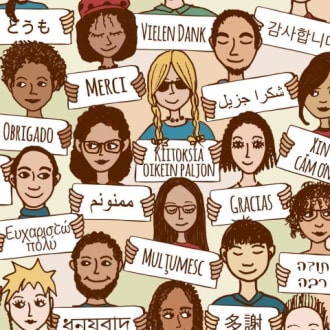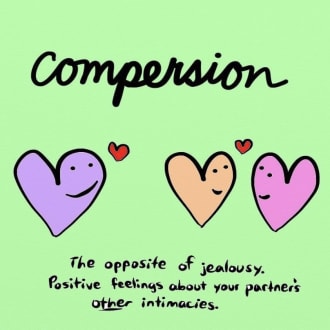The Best of Greater Good
20+ most popular Greater Good articles, as voted by our community.
Trending
These are currently making the rounds on Refind.
Three Steps to Resolving Big Conflicts
In a new book, a seasoned negotiator outlines how to move through conflict effectively, even in the most intractable situations.
Is Your Attachment Style Creating Tension in Your Relationship?
A therapist explains how to navigate insecure attachment and find better ways to communicate and address conflict with your partner.
Greater Good on Anxiety
What to Do With Dread and Anxiety About Climate Change
You're not alone if you're feeling dread and anxiety about climate change. A new book explains how to channel these feelings to fight for a better world.
Greater Good on Failures
How to Learn from Your Failures
Research suggests that we need to overcome some emotional and cognitive barriers if we’re to learn from our defeats—but it can be done.
«Failure bruises the ego, that metaphorical seat of our self-esteem and self-importance. When we fail, we feel threatened—and that sense of threat can trigger a fight-or-flight response.»
Greater Good on Gratitude
How Cultural Differences Shape Your Gratitude
Americans say thanks a lot, but other cultures may have a deeper understanding of gratitude.
Greater Good on Happiness
Happiness Break: Restore Through Silence
When was the last time you spent a moment savoring silence? Tricia Hersey, aka The Nap Bishop, guides us through an appreciation of silence and its restorative powers.
Wanting to Help Others Could Make You Happier at Work
A research review finds that employees who are motivated to be kind and helpful tend to have higher well-being at work.
Greater Good on Mental Health
A Five-Minute Breathing Exercise for Anxiety and Mood
Researchers have found that practicing "cyclic sighing" for five minutes a day can help you feel less anxiety and more positive emotions.
«Controlled breathing exercises may have a more rapid, more direct effect on physiology than mindfulness,»
What Type of Exercise Is Best for Mental Health?
A large new study looks at how exercise can help alleviate symptoms of anxiety and depression.
«a few ways to get yourself motivated to exercise»
Greater Good on Mindfulness
The Surprising Ways Your Mind Influences Your Health
A new book argues that we can harness the connection between our minds and our physiology for better health.
«What we should be learning from these studies is not that a particular drug is ineffective but rather how effective the placebo may have been»
The Top 10 Insights from the “Science of a Meaningful Life” in 2022
Our team names the most provocative and influential findings published during this past year.
«in deciding whether to do something generous or helpful for someone, we chronically underestimate how much beneficial impact we can make»
Greater Good on Personal Growth
How to Make Sure You Keep Growing and Learning
Small, everyday experiments can help us reach our goals and get better at the skills that are important to us.
«your focus is on getting better than you were in the past (rather than being preoccupied with whether you are better than others)»
Greater Good on Psychology
Four Ways to Turn a Bad Day Around
Some days, nothing seems to go right. Here are four steps to calm down and get things back on track.
Four Ways We Avoid Our Feelings—and What to Do Instead
Avoiding our emotions is not good for our mental health. A psychologist explains how to break the habit and embrace your vulnerability.
«Identify where you feel the sensation; locate it precisely, one place at a time—not just “My muscles are tense,” but which ones and where»
Greater Good on Relationships
The Eight Kinds of Humility That Can Help You Stay Grounded
There are many ways to be humble, according to recent research.
«Awe binds us to social collectives and enables us to act in more collaborative ways that enable strong groups, thus improving our odds for survival»
How to Communicate With Love (Even When You’re Mad)
A marriage therapist offers a step-by-step guide for a conversation with your partner when emotions are running high.
«I feel _________ when you _________ and I need _________f.”»
Popular
These are some all-time favorites with Refind users.
How to Get Comfortable With Uncertainty and Change
When life is uncertain, our usual responses and coping strategies might not always work. The practice of mental agility can help us be resilient.
«It comes down to the choice of stick or switch: Should I keep pursuing the same thoughts, feelings, and actions, or do I need to switch to something new?»
When You Feel Jealous, Think About Cultivating “Compersion”
New research on empathic joy points the way to closer intimate relationships.
«At its core, the principle of compersion relies on the dissolution of the perception of separation between self and other.»
How Much Control Do You Have Over Your Own Happiness?
Social conditions and inequality affect well-being. So, why do we keep insisting "happiness is a choice"?
«When I write that “structural forces” affect happiness, what do I mean? What does a structural force look like in society?»
Instead of Pulling Out Your Phone, Let Your Mind Wander
When we're waiting, we often have the urge to distract ourselves—but a new study finds we’d enjoy doing nothing but think.
«there were no significant differences between those who waited with or without a computer; both groups liked the experience equally.»
Why Sensitivity Is a Strength in Boys
It’s time to shift the paradigm about sensitivity in boys and recognize how it improves their relationships and supports their well-being.
What is Refind?
Every day Refind picks the most relevant links from around the web for you. is one of more than 10k sources we monitor.
How does Refind curate?
It’s a mix of human and algorithmic curation, following a number of steps:
- We monitor 10k+ sources and 1k+ thought leaders on hundreds of topics—publications, blogs, news sites, newsletters, Substack, Medium, Twitter, etc.
- In addition, our users save links from around the web using our Save buttons and our extensions.
- Our algorithm processes 100k+ new links every day and uses external signals to find the most relevant ones, focusing on timeless pieces.
- Our community of active users gets the most relevant links every day, tailored to their interests. They provide feedback via implicit and explicit signals: open, read, listen, share, mark as read, read later, «More/less like this», etc.
- Our algorithm uses these internal signals to refine the selection.
- In addition, we have expert curators who manually curate niche topics.
The result: lists of the best and most useful articles on hundreds of topics.
How does Refind detect «timeless» pieces?
We focus on pieces with long shelf-lives—not news. We determine «timelessness» via a number of metrics, for example, the consumption pattern of links over time.
How many sources does Refind monitor?
We monitor 10k+ content sources on hundreds of topics—publications, blogs, news sites, newsletters, Substack, Medium, Twitter, etc.
Can I submit a link?
Indirectly, by using Refind and saving links from outside (e.g., via our extensions).
How can I report a problem?
When you’re logged-in, you can flag any link via the «More» (...) menu. You can also report problems via email to hello@refind.com
Who uses Refind?
450k+ smart people start their day with Refind. To learn something new. To get inspired. To move forward. Our apps have a 4.9/5 rating.
Is Refind free?
Yes, it’s free!
How can I sign up?
Head over to our homepage and sign up by email or with your Twitter or Google account.




















